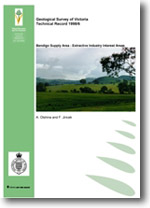Product description:
Download The downloadable version of this report is supplied in PDF format.
Executive Summary Quarries provide materials such as clay, sand and rock that have importance for all members of our society. Good management of such resources demands a careful balance of competing land uses to ensure that such resources remain available for future generations at an affordable cost.
The decision to identify stone resources in the Bendigo area has been made because:
- Bendigo is an important industrial centre dependent on locally derived extractive industry resources which are used as raw material for the manufacturing industry ; and,
- Bendigo is also a regional centre with a substantial population, and an important user of quarry products, including sand, gravel and aggregate.
This study aims to facilitate protection of stone resources by identifying Extractive Industry Interest Areas (EIIA) within the City of Greater Bendigo and selected nearby areas (the Bendigo Supply Area). This report has been produced in consultation with industry groups and relevant Government agencies, and will provide a base for identification and protection of stone resources in the Bendigo area.
The Extractive Industry Interest Area designation is applied to land that has been identified as being likely to contain stone resources of sufficient quantity and quality to support a commercial extractive industry operation. This should in no way be taken as an indication that a quarry can be established as-of-right in these areas. Any proposal to establish an extractive industry would be considered in the context of the assessment process under the Planning and Environment Act 1987, where, for example, social and environmental factors are considered.
The purpose of EIIAs is to:
- provide a basis for the long term protection of stone resources from sterilisation by other land uses;
- provide a basis for ensuring the long term availability of stone resources for use by the community and at minimal detriment to the environment;
- assist in considering extractive industry values in long term strategic planning;
- ensure that planning or responsible authorities consult with all relevant agencies about land use proposals which may impact on the reduction of stone resources within these areas, and
- create an awareness that extractive industry is a possible land use in these areas.
EIIAs do not:
- provide statutory protection for stone resources;
- allow extractive industry as-of-right, unless specified in a planning scheme;
- imply that future extractive industry will be confined to these areas or;
- preclude the use and development of land for other purposes.
It is intended that this report will be form part of the Local Planning Policy Framework of the Greater Bendigo Planning Scheme so that:
- planning authorities, when preparing planning scheme amendments within the designated EIIAs, consider the impacts any land use proposal or zoning changes may have on the continuing availability of stone resources, and consult with the Secretary of the Department administering the Extractive Industries Development Act 1995 on these matters; and
- responsible authorities, before considering a planning permit application that, if approved, would introduce residential land uses, rural residential land uses or land uses with residential or rural residential components within designated EIIAs, give notice of an application to the Secretary of the Department administering the Extractive Industries Development Act 1995.
The above provisions will ensure that any proposed land uses which may reduce the availability of stone resources are considered in accordance with Government policies.
The EIIAs are presented on a 1:100 000 scale map, together with brief descriptions of the local resource and also an indication of areas where extractive industries are unlikely to be permitted under current planning provisions.
Bibliographic reference Olshina, A. & Jiricek, F., 1998. Bendigo Supply Area - Extractive Industry Interest Areas. Geological Survey of Victoria Technical Record 1998/6. Geological Survey of Victoria.
|


